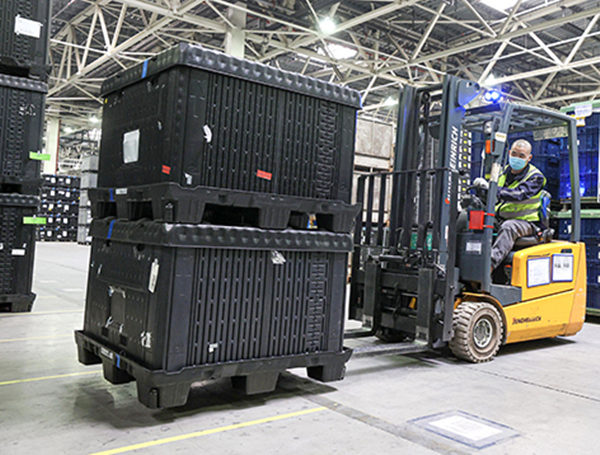BDA builds 'waste-free' city

Recycling packaging and packaging reduction projects have already eliminated nearly 100,000 tons of paper packaging for Mercedes Benz in Beijing. [kfqgw.beijing.gov.cn/Zhang Lei]
Since being selected as the national "11+5" "Waste-Free City" construction pilot in September 2019, the Beijing Economic and Technological Development Area (BDA) has formed a "Waste-Free City" construction model.
Core industries drive waste reduction and quality improvement throughout the industry chain.
In 2020, nine companies in the BDA, including Tetra Pak, BAIC Lear, Bayer Pharmaceuticals, Beijing Benz and BOE became national-level green factories, building three green supply chains.
The biomedical park is used as a pilot to build a temporary storage room for hazardous wastes with professionally qualified companies hired to provide on-site services.
The BDA has also established a comprehensive management platform serving solid waste resource transactions and facilitating solid waste management.
Besides, some high-value waste will be recycled into green products, and reused for park infrastructure construction to supplement urban energy supply.
Construction waste is used to build parks, and waste tires are used to pave roads.
The domestic waste classification and production-city integration model explored by the BDA gives it a leading position in classification effects in the city.
During the pilot period, the daily production of waste per capita was the same as the 2018 benchmark value (1.25 kg/person/day).
The recycling rate of household waste increased from 35 percent in 2018 to 40 percent, and the amount of food waste recycling increased by 5 percent. The amount of landfilled household waste was reduced from 33,800 tons in 2018 to 33,000 tons.
Furthermore, Internet technology is used to return the income from garbage classification to residents for daily consumption.
In 2020, residents' accumulated points for waste classification reached 12.4 million points, equivalent to 124,000 yuan ($19,083.6), and 363 tons of recyclables have been recovered, equivalent to 4 million yuan.

